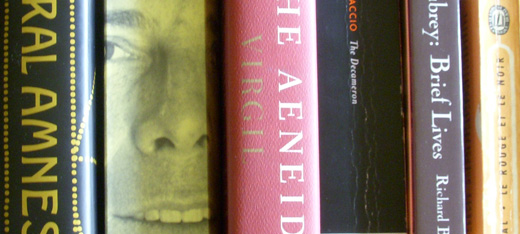Wednesday Morning Read
It has been difficult to focus the Morning Read books this week, because the sunny zephyrs of spring — bearing bird songs that I thought I’d only heard in the country — have lit up the imminent prospect of my daughter’s marriage, which would have been something of a happy distraction in any case but which, thanks to the weather, is an overpowering delight. The strain makes the two most congenial books on the list stand out in relief, and they are the oldest and the newest, Boccaccio and James. Â
¶ Is it a mark of the limits of Western tolerance for the irregular that Emilia’s story in the Decameron, VIII, iv has not been adapted for the stage? I should have thought that a love scene taking place entirely in the dark, with noisy but unseen going’s on in the next room, would have had a certain chic appeal. And then to discover that the randy old provost, whose a dislikable fellow in so many ways, has bedded not the fair widow but her grotesque housemaid. At the finale, the little boys would pepper the provost with a taunting chorus: “There goes the one who slept with Ciutazza!” while Ciutazza herself would sing beamingly in her new smock.
¶ In the Aeneid, Juno contrives to buy some time for her protégé, Turnus, by teasing him with the image of a fleeing Aeneas. Turnus chases the phantom right over the edge of a cliff and into the hold of a boat whose moorings are instantly cast off by the goddess, thus bearing Turnus to the safety of midsea. Turnus himself regards this translation as a punishment: to be taken out of battle is the last thing he wants. The whole episode seems uncertain, epic curdling into farce.
talia vociferans sequitur strictumque coruscat
mucronem, nec ferre videt sua gaudia ventos.
¶ In Aubrey, Thomas Hariot, a mathematician and astronomer who, surprisingly in someone who died in 1621, was a “Deist,” and James Harrington, a political thinker whose purely theoretical interest in elections and democracy put him in prison after the Restoration. Aubrey describes the “experiment” by which Harrington, sane about all other matters, sought to prove that his sweat turned into flies. Later, Harrington seems to have become senile — what we call Alzheimer’s these days. “It was a sad sight to see such a sample of mortality, in one whom I lately knew a brisk lively cavaliero…”
¶ “Transfigured Bird,” by James Merrill, was all the poetry I could swallow today. The poem seems hugely beyond me, loaded with allusions and connections that it would be grotesquely flat-footed, if all too likely, to mistake. The little hymn to woman’s beauty in the third section is almost runic:
          The bird in me
Sang on, a panic in my blood, a pain.Strange how that music made a woman’s beauty
Most notable for being frail, of such
A power one could have wept for frailty;Her hair too much like sun, her love too much
Like ignorance, perhaps. I must begin
To tell her of this music in my touch…
¶ In Le rouge et le noir, Stendhal rouses himself to make the following artless declaration:
Tout l’ennui de cette vie sans intérêt que menait Julien est sans doute partagé par le lecteur. Ce son là les landes de notre voyage.
The total boredom of the life led by Julien, without real interests, will no doubt be shared by the reader. These are the flatlands of our journey.
One wonders if Stendhal is out to write an anti-novel about his anti-hero. This is a very strange point in the course of a fiction to be lolling about in flatlands!
¶ Clive James’s piece on Marc Bloch is a lovely consolation piece. Nobody who has read the work of this most humane historian can help regretting that he involved himself in the Resistance with the result of being murdered in his prime. “Appalled by the cost in mental treasure, we can even call him irresponsible, the more easily to live with his example.”

